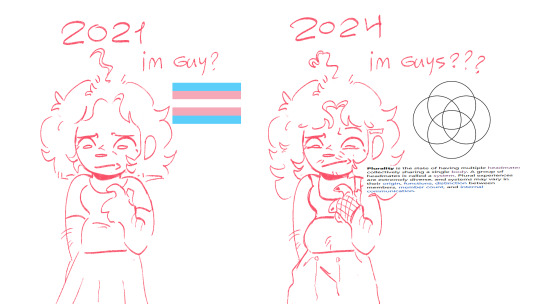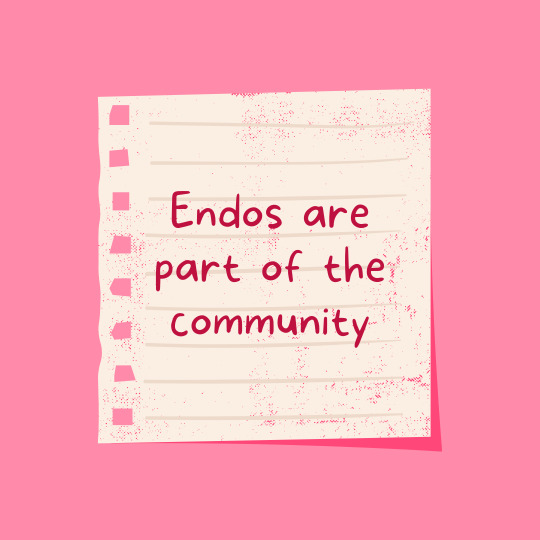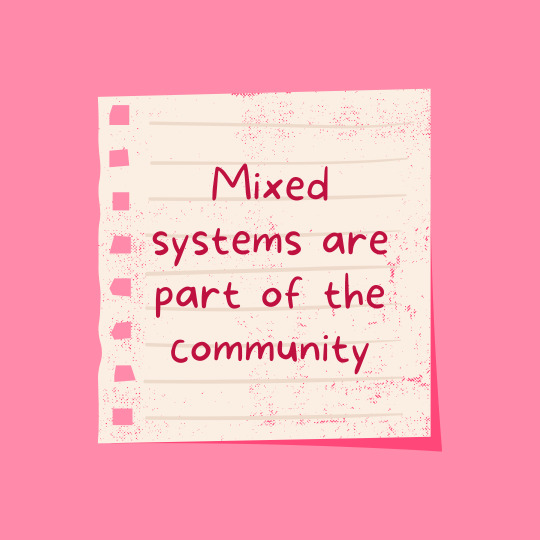| syscourse DNFI | | cupid’s arrows sys!| call us cecil or eros • bodily 20 • they/it/daze/vamp/ehe ��polyfragmented mixed-origins collective <3
Last active 60 minutes ago
Don't wanna be here? Send us removal request.
Text

Cecil/Cupid — also known as the Cupids Arrows Collective.
Body is 20 • Collective they/it pronouns • mixed-origins system
Our headmates will tag their own posts/reblogs with their name, and either .txt or .rb! If you need or would like something to be tw’d or cw’d, please let us know!
This blog has no DNI. We block freely.

0 notes
Text
being plural means a headmate pulling you into headspace to cuddle with you and help you go to sleep because of your& insomnia
being plural means smiling and laughing at a joke one of your headmates made, or having witty banter with them as you make a meal that you'll both be able to enjoy
being plural means a headmate going "its okay, you don't have to do this, i can do it" and you thanking them because yeah, you cant do that, and thats okay
being plural means thinking about your headmates when buying new clothes, or seeing a shirt or pair of pants for sale and going "they'd love that !!"
being plural means making one of your headmate's simplyplural profile, and spending lots of time perfecting it so that it fits them to a T
being plural means knowing you aren't alone
being plural means knowing that your headmates, your friends, your family, are always there for you
being plural means love.
THIS POST IS INCLUSIVE OF SYSTEMS OF ALL ORIGINS !!! DO NOT BRING SYSCOURSE ONTO THIS POST.
3K notes
·
View notes
Text
It’s so, so weird being a brainmade sysmate in this economy.
Like. I’m trying to find fanart of my “source” - moreso memories. And when I come up with squat? I’m suddenly reminded that my source does not exist ™️ in the real world.
I have my friends, but still, I miss my game-source :{.
0 notes
Text
Systems I'm curious how many in the community self identify with each origin and also how many there are with each diagnosis status.
Please refrain from hate filled attacks against any individual, syscourse stance, or identity. These will be deleted/users blocked.
64 notes
·
View notes
Text
this self-indulgent joke has been marinating in my head for over a month and i doodled it only now; you're welcome to tell me that im the funniest person ever

[if anyone sees this post at all: for the love of god do not tag this with 'endo's dni/endo's fuck off']
4K notes
·
View notes
Note
Aventurine (honkai star rail) mixed origins

Aventurine from Honkai Star Rail is mixed origins!
20 notes
·
View notes
Text










Some pro-endo reminders 💟 Free to use/steal!
1K notes
·
View notes
Text
Systemabro
(pt: Systemabro /end pt)

Systemabro; an orientation that changes due to who's fronting, with different headmates having different levels of attraction/genders they’re attracted to.
etymology; system, abro
for anon!
let us know if this is a recoin!
tagging; @radiomogai
30 notes
·
View notes
Text

In Night Vale, it's considered rude to kiss with your eyes closed.
716 notes
·
View notes
Text

Thinking about my favorite husbands
1K notes
·
View notes
Text
you all know about the cecilos charlie brown voiceover right
1K notes
·
View notes
Text

He did this in 2012 and it worked
3K notes
·
View notes
Text
Unmasking 101
This is our own post covering unmasking as a system, something that we have been able to accomplish to an extent that we are quite comfortable with. We hope that it will prove useful to some of y’all!
Disclaimer: we are one system with DID, and we can only provide our own perspective at this time. What has worked for us may or may not work for you, so use your best discretion when following the advice listed here!
What is masking?
Masking is the concept of hiding, disguising, and/or suppressing neurodiversity in an attempt to appear neurotypical. Neurodiverse people may mask for a wide variety of reasons, including to help keep themselves safe, to fit in and make friends, to avoid drawing unwanted attention, to be taken seriously by others, and more. While masking most often refers specifically to autistic experience, anyone with any sort of neurodiversity can mask.
Masking vs. Covertness
Quite often, complex dissociative disorders like DID are covert, meaning their symptoms may not be easily noticed or recognized by outsiders. Having covert symptoms is not the same as masking! It is possible to live a happy, healthy life with a covert disorder, without ever needing to “unmask” or trying to make your symptoms more noticeable.
What’s most important is learning how to live an authentic life that helps you and your system feel safe, comfortable, and happy as you are! In fact, attempting to unmask when in actuality your disorder is just covert, this could have negative, harmful, or otherwise adverse affects on your system. It’s never good to try and force yourself or your headmates to be something you’re not, and this goes for systems with covert symptoms and presentations!
What does masking look like?
In systems, masking can look like:
- other headmates acting like the host when they front
- the whole system adopting similar mannerisms in order to appear as a singlet
- acting like memories, events, and things around you are cohesive and make sense to you when they really aren’t
- pretending to recognize others or recall information that you simply cannot remember
- attempting to quell or silence internal communication and dialogues between other system members
- consciously or unconsciously ignoring signs or plurality in your own life
- copying or mirroring the actions and behaviors of the singlets you meet and interact with
And so much more! Every system is different, so masking can look very different from system to system.
How can we unmask?
Unmasking is a process that may take lots of time, patience, and effort to achieve. But it most certainly can be done! Here are a few steps you may take while undergoing this transition from masking to unmasking:
1) Recognize when you are masking.
Try to notice when you or your system members are attempting to hide, disguise, or otherwise conceal your plurality. What actions do you take to mask? What situations do you find it easier or more difficult to mask? Do certain headmates tend to mask more than others? Do you tend to mask more around certain people and places?
At this stage there’s no need to try and stop masking immediately. Just try to take it slowly and start noticing masking behaviors as they arise. If you have a system journal or some other place where you all keep thoughts organized, perhaps make a list of the masking behaviors you all are noticing in your system. Recognizing behaviors is a solid first step towards changing them!
2) Understand why you are masking.
Quite often systems mask as a self-defense mechanism. Are you in a safe environment? Do you still live, work, or associate with abusers or others who would not understand your plurality? Who benefits from your system masking? Who is harmed? Is masking easy and second-nature for your system, or is it difficult and exhausting? These sorts of questions can help answer whether or not it will be safe to mask, and whether or not you actually are masking or just have a covert/less noticeable presentation for your system.
3) Have internal conversations.
To better understand yourself, your system, why you mask, and when you mask, internal communication is key. You may have headmates who are purposefully masking in order to protect themselves and your whole system. You may have in-system roles and functions that are specifically dedicated to masking. You may have headmates who were masking without even being aware that they were doing so. Having lots of safe, open, and welcoming discussions with your headmates can help you better understand masking in your own system, and how best to formulate a plan to unmask in your daily life.
You may ultimately come to the conclusion that masking is what’s best for your system at this time, and that’s okay! Please prioritize your own health and safety over your desire to be your authentic selves. Sometimes it just isn’t safe to attempt unmasking. You know yourself, your system, and your situation best, so try to work together with your headmates to come up with a plan that works well for everyone!
4) Encourage internal and external authenticity.
Once you have a good idea of when, why, and how your system masks, you can start taking steps to change these actions and behaviors (granted, that you are in a safe place to do so!). In our experience, this can be achieved by encouraging headmates to branch off in their own ways as they have the desire to do so. Creating a safe space inside where headmates can feel secure in exploring their identities is crucial for unmasking!
It may happen slowly, but it starts by encouraging small actions and desires that headmates have which differ from each other. A headmate wants to use a specific tonal inflection that’s different from fellow members? Go for it! A headmate wants to engage in an activity that is uncharacteristic for their system as a whole? As long as it’s safe, do it! Creating an internal environment of acceptance and then encouraging each other to embrace small moments of authenticity can help chip away at that mask.
5) (if possible) Build an outside safe space.
If your system has another person in your life who knows about your plurality and is willing to accept you all unconditionally, this can be incredibly healing and work wonderfully to help unmask. Just existing around our therapist and our partner system have helped us to embrace our individuality and accept our unique features when fronting. If there is a loved one in your life who knows about your system, maybe try explaining the concept of masking to them, and ask them to help support you through this unmasking process.
If there is no one in your life who you can safely unmask around, you can still try to practice unmasking by doing so when you are alone. But please, try to center your system’s safety as you go about this process! Don’t attempt to unmask if masking is what’s keeping your system safe, healthy, and alive.
6) Don’t compare yourselves to others.
It may be tempting to compare how your system functions to others. Some systems might have never had to mask. Some might find unmasking to be a quick and easy process. Just because it may be difficult for you doesn’t mean that it’s impossible! Please try to avoid comparing yourselves to other systems, and even other headmates in your own system. Some headmates may be able to unmask more easily than others, and that’s okay! Respect each headmate’s individual needs and abilities, and go at your own pace.
What if we go back to masking after unmasking for a while?
This is only natural! After habits have been built up and practiced for so long, it can be difficult to change them in a permanent way. Masking after unmasking for a while is nothing to be ashamed of, and doesn’t mean your system has lost any progress! Many systems may find that their unmasking process happens in waves or cycles, with each cycle of unmasking followed by a masking period. The more and longer you’re able to unmask, the shorter your next masking cycle may be!
Don’t give up! If you find that your system has reverted to old ways, simply start at the beginning, show yourselves patience and understanding, and start recognizing when you mask once again.
In Conclusion
A TLDR might be: masking, or hiding/concealing neurodivergent traits, is common in neurodivergent people. Masking is not the same as having covert symptoms, so please try and understand the differences before attempting to unmask. Masking can look incredibly different and have a wide range of presentations. By learning about yourself, understanding when, why, and how you mask, having internal conversations about masking, encouraging authenticity, building internal and external safe spaces, and having patience with yourselves, you can start trying to unmask. Having a safe person to be open with about your plurality may help with this process, and avoiding comparing yourselves to others can help too! If you regress, backslide, or go back to masking after a while, that does not invalidate your progress - keep going and don’t give up! In all of this, center your system’s safety and security, and don’t attempt to unmask if it could be dangerous for your system.
We’re sorry this got so long (this is actually a very complex topic!) but we hope this helps! If anyone has any further questions regarding masking or unmasking as a system, don’t hesitate to reach out. And of course, we are just one system providing our perspective, so don’t be alarmed if what we’ve said here isn’t all that applicable to your system.
If you’ve made it this far, thank you so much for taking the time to read! We’re wishing you and your system the very best of luck in your unmasking endeavors. Take care, and have a wonderful day!

137 notes
·
View notes
Text
what “feeling better” can look like after using a coping technique:
beng able to get up and walk around safely
thinking/talking more clearly and lessening of brain fog
a willingness to re-engage with a situation/emotion (even with some reluctance)
ability to do a task you did not want to/could not do before
being able to plan and problem solve (even if you still don’t know what to do)
improved concentration/focus
more understanding of a situation
calmer and slower thoughts (rather than scattered thoughts/rumination)
slower heartbeat and breathing
faster heartbeat, if doing exercise, and momentum that gives you a chance to do a task before you sit down again
being able to sleep easier
an ability to look at the big picture and not get lost in the details
feeling that you can “manage”
ability to control outbursts/destructive behaviour or pause before acting
managing to stop crying
I think people tend to assume their mood is what will improve after trying coping techniques, however, your mood is not the full extent of your mental health, and it doesn’t totally define whether or not a technique has helped you. When disorders cause symptoms like chronic emptiness and low mood, it’s worthwhile to pay attention to your body and your abilities to look for signs of improvement, which can then have an affect on your mood in the long term.
12K notes
·
View notes
Text
Here’s some positivity for systems and headmates with conflicting and/or contradictory queer labels!
System life and queer identity can both be confusing, messy, and complicated. Often, headmates in a system may have unique or uncommon experiences and ways of relating to their body, headmates, the world around them, and even themselves - but this in no way invalidates the ways they identify! This post is for all the systems and headmates whose queer labels seem conflicting and/or contradictory!
🏳️🌈 Shoutout to systems and headmates who are mspec gays and lesbians!
🏳️⚧️ Shoutout to headmates who are AMAB transmasc, AFAB transfem, transfemmasc, or transfemneumasc!
🏳️🌈 Shoutout to systems and headmates who are sex-favorable asexuals, or who tolerate, engage in, or enjoy sex while still being asexual!
🏳️⚧️ Shoutout to systems and headmates who are aromantic while still having and loving their romantic partners and relationships!
🏳️🌈 Shoutout to systems and headmates who are bigender, trigender, boygirls, girlboys, or who are multigender in some other way!
🏳️⚧️ Shoutout to systems and headmates who are aplatonic while still having friends, wanting friends, or who wish they wanted friends!
🏳️🌈 Shoutout to systems whose plurality complicates their understanding of gender, sexuality, romantic attraction, and queer identity!
🏳️⚧️ Shoutout to systems and headmates who choose not to label their queer identity due to its complex nature!
🏳️🌈 Shoutout to systems and headmates with conflicting or contradictory xenogenders, or who use conflicting or contradictory neopronouns!
🏳️⚧️ Shoutout to those who have been fakeclaimed, bullied, or told they are harmful because of their conflicting/contradictory labels - you did not deserve that mistreatment and you are wonderful as you are!
🏳️🌈 Shoutout to systems and headmates who use conflicting or contradictory labels as they are still questioning or unsure about their queer identity!
🏳️⚧️ Shoutout to systems and headmates who are both boys/men and lesbians, or both girls/women and gay!
There is no one right or wrong way to be queer or plural. It’s okay to have labels and identify in ways that may seem or are conflicting or contradictory! Identifying in this way does not invalidate you as a system, headmate, or member of the queer community. You belong here and you make both plural and queer spaces more beautiful simply by existing in them!
We hope that you and your system can come to accept and embrace your queer labels and identities, even and especially if they are conflicting or contradictory. Know that you aren’t harming anyone by identifying in the ways that you do, and in fact, you are spreading warmth, joy, and hope by becoming your authentic self! Regardless of your queer identities or what labels you use, we love you and we want to support and uplift you however we can. Thank you so much for reading, and have a great day!

150 notes
·
View notes
Text
Did I go through enough to cause DID?
by Sunflower
—
Did I go through enough to cause DID?
“Do you really want to know?” says a concerned voice, from the back of my mind.
“Yes. Why shouldn’t I know?” comes a reply, not from me.
“Maybe,” comes another.
“I guess not,” I finally say. I shouldn’t have bothered asking this question.
—
Did I go through enough to cause DID?
“No,” says a small voice to me.
“Why do you think that?” I ask it.
There’s no answer. Only crying.
—
Did I go through enough to cause DID?
“Yes,” states someone matter-of-factly.
“How do you know for sure?”
“You’re literally talking to an alter, right now,” they point out.
Ugh! How is that supposed to answer my question?!
—
Did I go through enough to cause DID?
“Fuck off with these questions! It’s ridiculous!” growls something from deep inside, bubbling with rage. “Do you think this is fun? Do you think this is a game?”
I don’t.
Oh God, I don’t.
—
Did I go through enough to cause DID?
Screams.
Ripping.
Spiraling.
Falling apart.
—
Did I go through enough to cause DID?
“Why does it matter?” replies someone in the back.
“I don’t know,” I confess.
“Does it matter to you?”
“No, I guess not.”
“Does it matter to someone else?”
They already know the answer. They’re sitting in the back of my thoughts with it.
—
Did I go through enough to cause DID?
“Do you feel like you’re not hurt enough?” Someone asks this.
The background is wracked with voices mirroring my own. Some shout yes, others shout no. I don’t know if they’re my own thoughts or something else.
“I’m not sure,” I finally say, confused.
—
Did I go through enough to cause DID?
“Why are you asking this so much?” a voice asks.
“Well, sometimes I just wonder if I was hurt enough to have DID,” I explain.
“You have it. Doesn’t that already answer your question?”
“No,” I reply, a bit angrily. “I don’t feel like what I went through justifies me having DID like this. Wouldn’t my childhood have to be extremely unnatural? I mean, sure, I was suffering, but was that enough?”
“You do realize that suffering isn’t natural, right?”
I don’t know how to reply.
—
Did I go through enough to cause DID?
A child is asking me this. I hold them close. I cradle them in my arms and rock them.
“I wish you didn’t,” I sigh.
—
Did I go through enough to cause DID?
“You went through too much,” says someone else.
“Yeah. You did, too,” is all I can utter.
Acceptance fills out the space between us.
—
Did I go through enough to cause DID?
A sad voice whispers through the frosty darkness. “I don’t wish anymore pain onto you.”
“I don’t wish it onto you, either,” a voice whispers back.
I touch their hands. We are connected.
—
Did I go through enough to cause DID?
“Yes, and the proof is in our existence. Our existence is proof of our survival,” a familiar voice answers me.
We survived?
“You did. I did. All of us survived.“
I feel the others shift inside. Warmth blossoms in my chest.
The system that is me, suffered. The system that is me, also survived.
Maybe knowing this is more important.
2K notes
·
View notes
